Reply To Farewell Letter
Dear [Sender's Name],
Thank you for your heartfelt farewell letter. Your words touched me deeply, and I am grateful for the opportunity to respond and express my own feelings.
First and foremost, I want to express my sincere appreciation for your kind words and the impact you believe I have made during my time with you. It means a great deal to me to know that my contributions have been recognized and valued. Your acknowledgment of my efforts and the positive impact I have had on the team is incredibly rewarding.
I am truly honored to have been a part of such an amazing group of individuals. The memories we have created together, the challenges we have overcome, and the camaraderie we have built will always hold a special place in my heart. Working alongside each and every one of you has been a privilege, and I am grateful for the friendships that have blossomed as a result.
While it saddens me to bid farewell to such an incredible team, I am also excited about the new opportunities and experiences that await me. Change is a natural part of life, and it allows us to grow, learn, and explore new horizons. I will cherish the lessons I have learned here and carry them with me as I embark on this new chapter of my journey.
Please know that even though I may be physically departing, my support and well wishes will always remain with you. If there is ever anything I can do to assist you, please do not hesitate to reach out. I firmly believe in the potential and capabilities of this team, and I have no doubt that you will continue to achieve great things together.
Once again, thank you for your kind words and for making my time here truly memorable. I am grateful for the opportunity to have been a part of this incredible team, and I will carry the experiences and connections I have made here with me throughout my career and beyond.
Wishing you all the very best in your future endeavors.
Warmest regards,
[Your Name]
Formal Reply to a Farewell Letter from a Colleague
Dear [Colleague's Name],
Thank you so much for your heartfelt farewell letter. Your words truly touched me, and it has been a privilege to work alongside you.
I wish you nothing but success and happiness in your future endeavors. May your next chapter be as remarkable as your time here with us.
Warm regards,
[Your Name]
Casual Reply to a Friend’s Farewell Letter
Hi [Friend's Name],
I just read your farewell letter, and I can’t believe it’s really happening! It’s been amazing having you around, and your presence will be missed.
Good luck with everything ahead—remember to keep in touch, and don’t forget about our fun memories here!
Cheers,
[Your Name]
Heartfelt Reply to a Family Member’s Farewell Letter
Dear [Family Member's Name],
Your farewell letter moved me deeply. While it’s hard to imagine the house without you, I am so proud of the path you’re taking.
Know that you always have my love, support, and encouragement, no matter where life takes you.
With love,
[Your Name]
Professional Reply Email to a Team Member
Dear [Team Member's Name],
Thank you for your kind farewell message. Your contributions to our team have been invaluable, and you will be greatly missed.
We wish you continued success and hope our paths cross again in the future.
Best regards,
[Your Name]
Short and Simple Reply to a Farewell Note
Hi [Name],
Thanks for your farewell note! Wishing you all the best in your next adventure. Keep in touch!
Regards,
[Your Name]
Creative and Funny Reply to a Farewell Letter
Hey [Name],
So you’re leaving us? Guess we’ll have to survive without your terrible jokes and endless coffee breaks!
Seriously though, good luck with your new journey—we’ll miss you more than you realize. Don’t be a stranger!
Cheers,
[Your Name]
Reply to Farewell Letter from a Mentor
Dear [Mentor's Name],
Your farewell letter was truly inspiring. I am grateful for your guidance, support, and wisdom throughout our time together.
I wish you immense success and fulfillment in your next endeavors. Your lessons will always remain with me.
Sincerely,
[Your Name]
What / Why: Purpose of a Reply to Farewell Letter
A reply to a farewell letter is a written response acknowledging and appreciating the message sent by someone leaving a place, organization, or group.
Its purpose is to:
- Show gratitude for the sender’s kind words
- Strengthen relationships and leave a positive impression
- Convey best wishes for their future endeavors
- Maintain professional, personal, or emotional connections
Who Should Send a Reply
- Colleagues responding to departing coworkers
- Friends replying to personal farewell notes
- Family members acknowledging family departures
- Supervisors or mentors responding to team member farewell letters
- Students or classmates replying to peers leaving school or college
Whom to Address
- Directly to the sender of the farewell letter
- In group settings, replies can be sent to the team, family, or class involved
- Consider addressing mutual friends or colleagues if a collective farewell is appropriate
When to Send a Reply to a Farewell Letter
- Immediately after receiving the farewell letter
- Before the sender officially leaves, if timing allows
- During farewell events, gatherings, or parties
- When the farewell was sent digitally, a prompt reply shows attentiveness
How to Write and Send a Reply
- Start with a warm greeting and acknowledgment of the original letter
- Express gratitude and appreciation for their contributions or presence
- Include positive reflections, memories, or shared experiences
- Offer best wishes for their next journey
- Decide on appropriate mode: printed letter, email, or casual message
- Close with a friendly or professional sign-off
Formatting and Style Recommendations
- Length: 1–3 paragraphs for email/message, 3–5 paragraphs for formal letters
- Tone: Align with relationship—formal, casual, heartfelt, or humorous
- Wording: Positive, encouraging, and appreciative
- Mode: Email for quick replies, printed letters for formal or sentimental contexts
- Etiquette: Avoid negative reflections or criticism; focus on positive memories and best wishes
Requirements and Prerequisites Before Replying
- Ensure you have read the farewell letter thoroughly
- Recall shared experiences or contributions worth mentioning
- Decide the tone and style suitable for the recipient and relationship
- Choose the appropriate mode of sending (digital or printed)
Tricks and Tips for Crafting a Memorable Reply
- Personalize with anecdotes or memories
- Keep it concise and sincere
- Use humor carefully if it matches the relationship
- Mention shared accomplishments or moments
- Always end on a positive and hopeful note
Common Mistakes to Avoid
- Ignoring the farewell letter entirely
- Writing an overly long or formal message for casual relationships
- Using negative language or focusing on what you’ll miss
- Forgetting to send the reply promptly
- Neglecting to personalize the message
After Sending / Follow-up Actions
- Ensure the sender received your reply if appropriate
- Optionally, send a small token of appreciation or organize a farewell gathering
- Keep in touch periodically to maintain the relationship
- Share updates or messages when mutual connections are involved
Elements and Structure of a Reply to Farewell Letter
- Greeting addressing the sender
- Acknowledgment of the original farewell message
- Expression of gratitude or appreciation
- Positive reflections, memories, or achievements
- Best wishes for the future
- Closing signature (friendly or formal)
Pros and Cons of Sending a Reply
Pros:
- Reinforces relationships and positive memories
- Leaves a professional and courteous impression
- Provides closure for both sender and recipient
Cons:
- May feel obligatory in large groups
- Risk of misaligned tone if relationship nuances are not considered
- Too casual or humorous replies may offend in formal contexts
Compare and Contrast: Reply vs Other Modes
- Reply Letter vs Phone Call: Letters provide a tangible keepsake; calls allow immediate emotional interaction
- Email vs Printed Letter: Emails are fast and convenient; printed letters feel more personal and memorable
- Reply vs Group Message: Personal replies show thoughtfulness; group messages can be efficient but less intimate
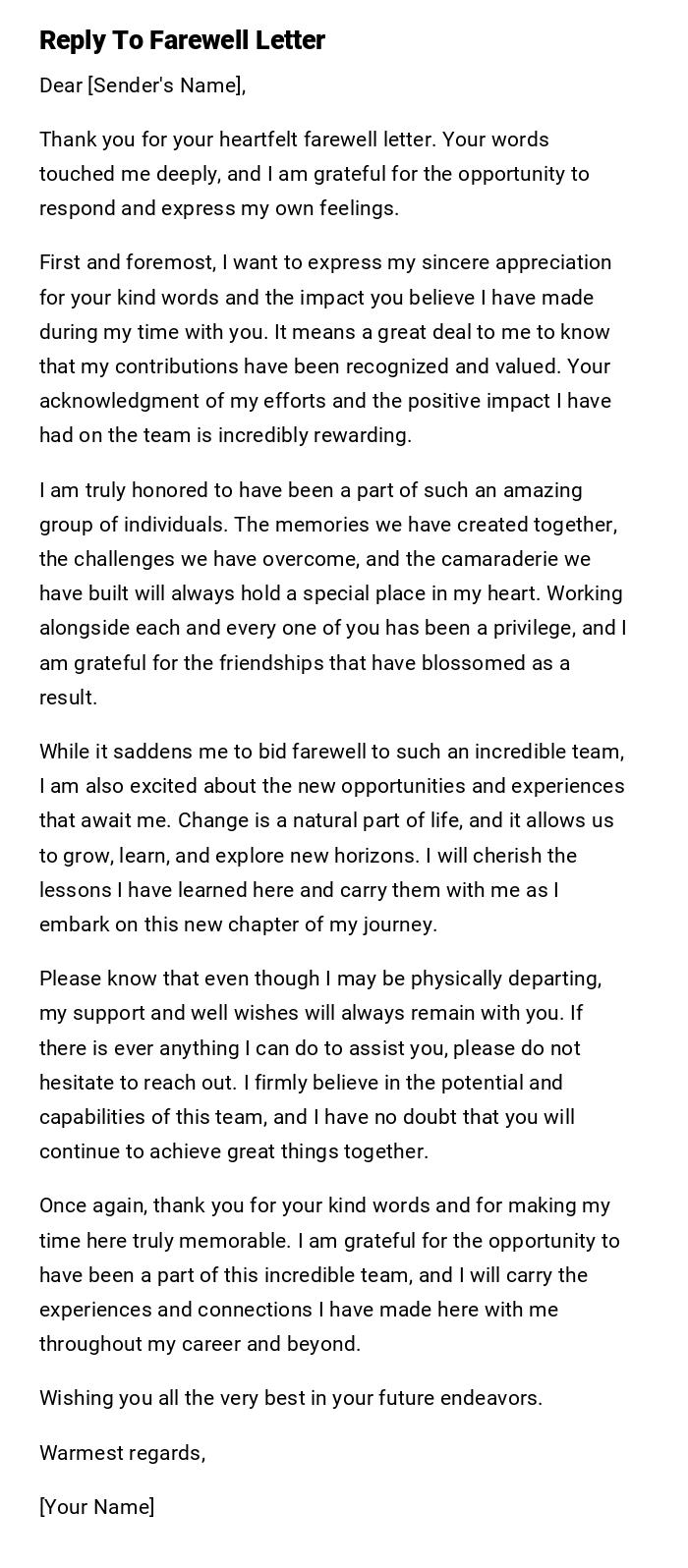
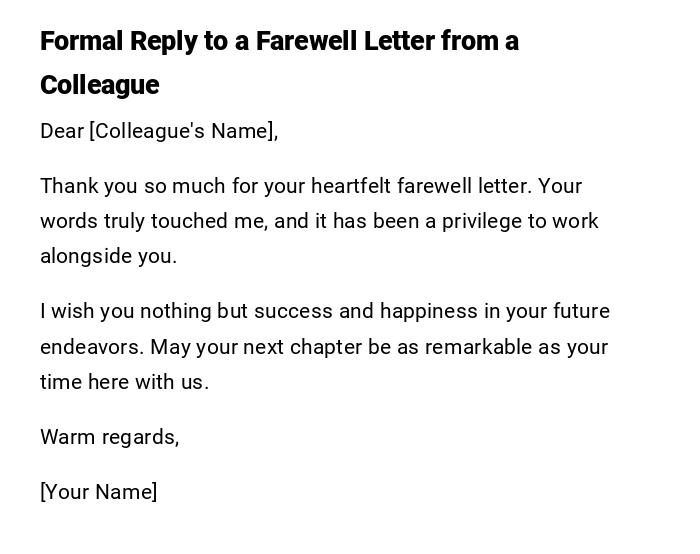
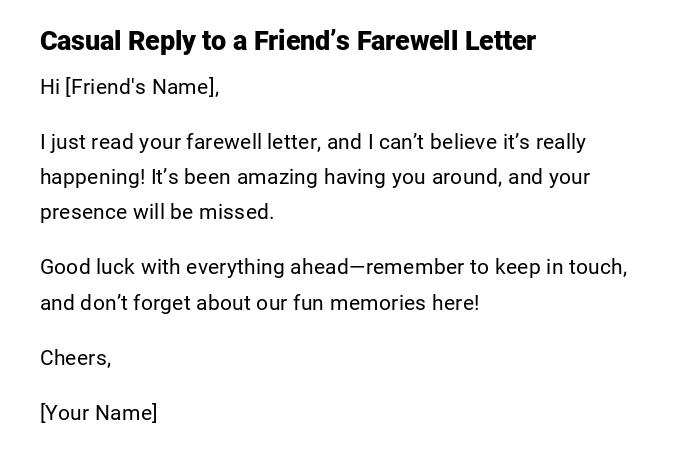
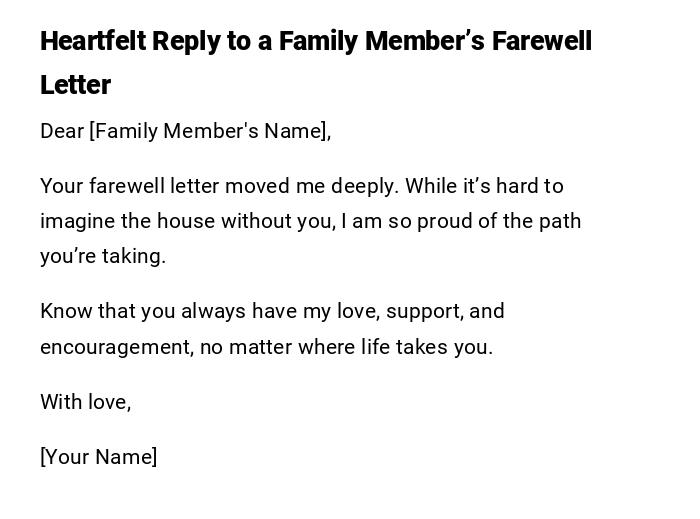
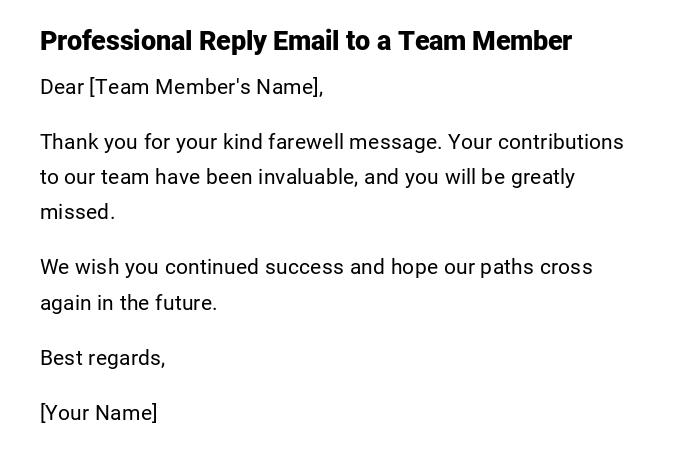
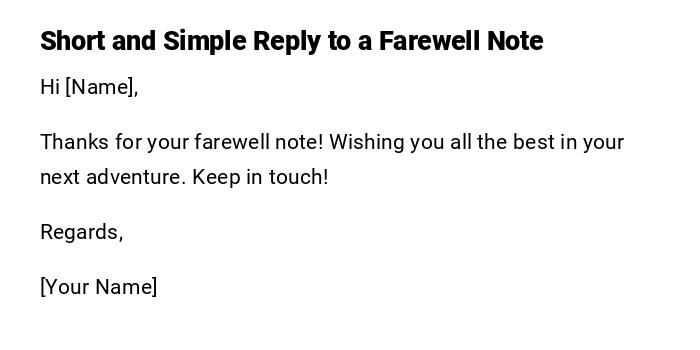
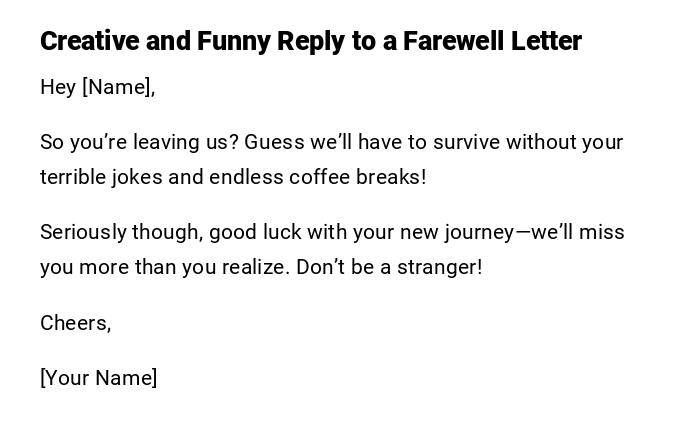
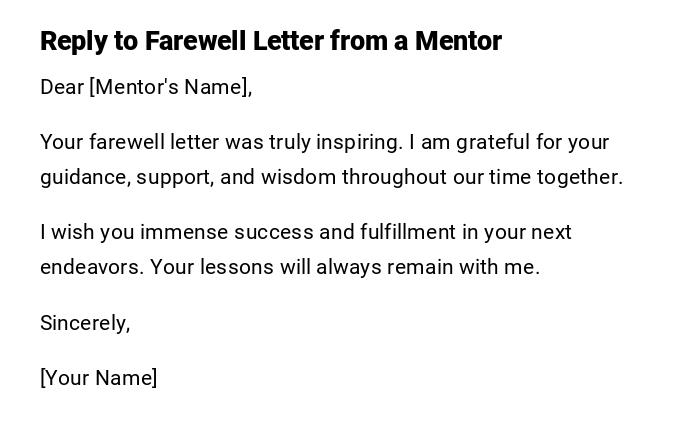

 Download Word Doc
Download Word Doc
 Download PDF
Download PDF